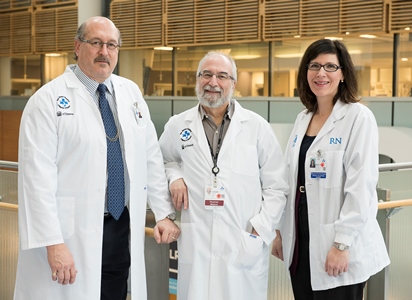 From left: Mark Freedman, Harold Atkins and Marjorie Bowman
From left: Mark Freedman, Harold Atkins and Marjorie Bowman
The American Society for Blood and Marrow Transplantation has recommended that stem cell transplantation for MS, which has been pioneered at The Ottawa Hospital, be considered a “standard of care, clinical evidence available” for people with certain forms of the disease.
Their recommendation is based on 16 studies, including a pivotal clinical trial published by Dr. Harold Atkins and Dr. Mark Freedman in 2016.
The Society’s expert panel found that after the transplant procedure, “many patients with MS experienced rapid, complete, and durable control of inflammatory disease activity, with resultant improvement in long-term clinical outcomes.” Preliminary evidence also shows the procedure “appear(s) to be superior” to conventional MS drugs.
The Society recommended the transplant procedure for patients with a high risk of future disability who continue to have inflammation while on MS drugs. They also called for more research to optimize patient selection and transplant protocol.
“It is great to see stem cell transplantation becoming more widely accepted for MS,” said Dr. Atkins and Dr. Freedman. “But patients need to be careful because this procedure should only be done at specialized and reputable academic medical centres.”
Stem cell transplantation can also have serious side effects. People who are interested in this therapy should speak with their own neurologist.
Research at The Ottawa Hospital is possible because of generous donations to The Ottawa Hospital Foundation.
Dr. Atkins is a stem cell transplant physician and scientist at The Ottawa Hospital and associate professor at the University of Ottawa. Dr. Freedman is a neurologist and senior scientist at The Ottawa Hospital and professor at the University of Ottawa.
Authors: Cohen JA, Baldassari LE, Atkins HL, Bowen JD, Bredeson C, Carpenter PA, Corboy JR, Freedman MS, Griffith LM, Lowsky R, Majhail NS, Muraro PA, Nash RA, Pasquini MC, Sarantopoulos S, Savani BN, Storek J, Sullivan KM, Georges GE.
The Ottawa Hospital: Inspired by research. Driven by compassion
The Ottawa Hospital is one of Canada’s largest learning and research hospitals with over 1,100 beds, approximately 12,000 staff and an annual budget of over $1.2 billion. Our focus on research and learning helps us develop new and innovative ways to treat patients and improve care. As a multi-campus hospital, affiliated with the University of Ottawa, we deliver specialized care to the Eastern Ontario region, but our techniques and research discoveries are adopted around the world. We engage the community at all levels to support our vision for better patient care. See www.ohri.ca for more information about research at The Ottawa Hospital.
University of Ottawa: —A crossroads of cultures and ideas
The University of Ottawa is home to over 50,000 students, faculty and staff, who live, work and study in both French and English. Our campus is a crossroads of cultures and ideas, where bold minds come together to inspire game-changing ideas. We are one of Canada’s top 10 research universities—our professors and researchers explore new approaches to today’s challenges. One of a handful of Canadian universities ranked among the top 200 in the world, we attract exceptional thinkers and welcome diverse perspectives from across the globe. www.uottawa.ca
Media Contact
Jennifer Ganton
Director, Communications and Public Relations
Ottawa Hospital Research Institute
Office: 613-798-5555 x 73325
Cell: 613-614-5253
jganton@ohri.ca
